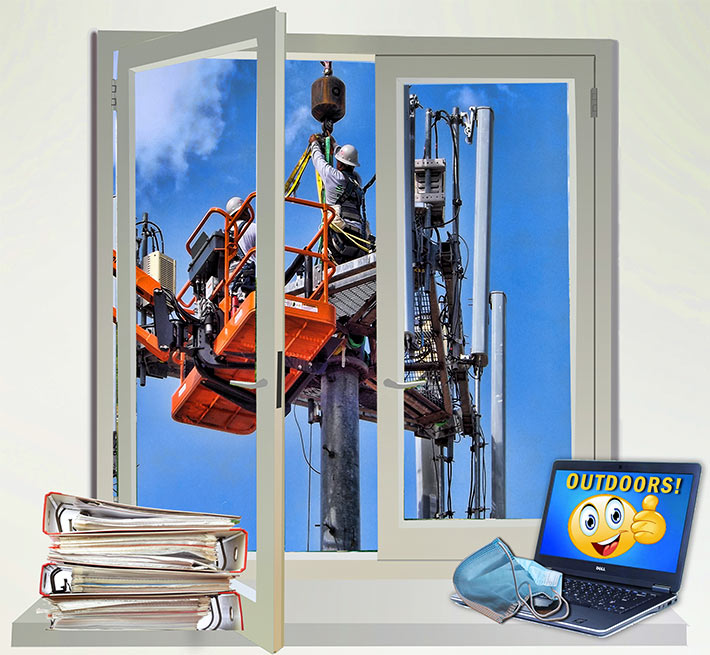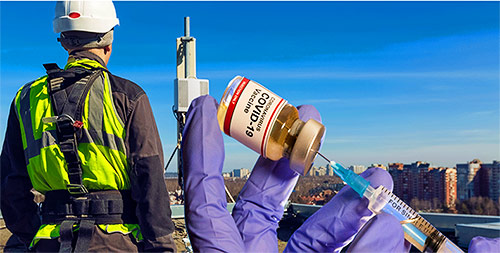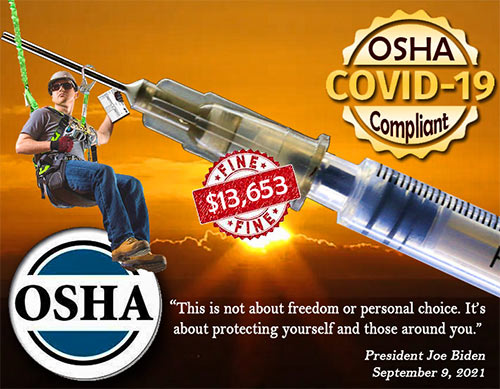
Tower crews working outdoors might be exempt under OSHA’s Emergency Temporary Standard requiring COVID-19 vaccinations or weekly testing. One industry observer suggested renaming the 490-page rule The Lawyer’s Pandemic Relief Act of 2021.
Update: November 6, 2021 – A federal appeals court in Louisiana has blocked President Biden’s latest COVID-19 vaccination mandate, giving the government until Monday afternoon to submit a response.
An emergency stay, issued Saturday from the United States Court of Appeals for the Fifth Circuit, prevents the White House from requiring all full and part-time workers at private-sector companies with 100 or more employees to be vaccinated or get tested weekly and wear face masks.
In its decision, the court cited “grave statutory and constitutional” concerns about the government’s mandate, which is scheduled to take effect on January 4.
President Joe Biden’s vaccine mandate for employers with 100 or more employees will take effect on January 4, 2022, when these employees will either have to be fully vaccinated or submit weekly COVID-19 tests to their employer. They will be required to wear a face mask at work beginning December 5, 2021, according to OSHA’s rule, an Emergency Temporary Standard (ETS) unveiled yesterday.

Field workers of companies with over 100 employees that work outdoors might be exempt from getting a COVID-19 vaccine. However, it appears that they would all have to use their personal vehicles since riding in a crew cab would take away the exemption.
OSHA is also eyeing smaller contractors for its vaccine mandate
Smaller contractors could also be required to adhere to the mandate. OSHA said that it is confident that companies with 100 or more employees can easily use administrators to implement the standard’s requirements, but it is less confident that smaller employers can do so without undue disruption.
However, OSHA said that it needs additional time to assess the capacity of smaller employers, and is seeking comment in order to make a determination.
Contractors, even if they have over 100 employees, might not have to require their service crews to be compliant with the vaccination mandate, if “they perform their work exclusively outdoors,” according to the OSHA rule. However, it is being recommended that companies obtain legal counsel to review their company policy.
OSHA cautions companies that their outdoor workers can not enter a workplace where other workers are present, a requirement that would prevent crews from entering their office, and/or possibly loading and preparing materials in a warehouse that maintains workers who manage the facility.
A brief indoor visit might be acceptable
The rule does state, however, that an outdoor worker would be compliant if the time they spent indoors is “brief”.
 There would be additional costs incurred by contractors if they wanted their crews to be exempt.
There would be additional costs incurred by contractors if they wanted their crews to be exempt.
OSHA states that if an employee works primarily outdoors but routinely occupies vehicles with other employees as part of work duties, that employee is not covered by the exemption.
Therefore, to be compliant, wireless workers would have to arrive at the jobsite in their own vehicles.
If there are several brief periods in a day when an employee goes inside, the agency said it will total those periods of time when determining whether the exception for exclusively outdoors work applies.
Labor attorneys who have reviewed the OSHA rule believe that if related companies are managed in a way that combines the control of occupational safety and health measures, then their employees should be counted together towards the 100-worker threshold.
If a worker is fired for not following the rules in OSHA’s mandate, it is unknown if they will be eligible for unemployment since each state has its own standards and there have been varying interpretations.
OSHA has determined that if a worker has already had COVID-19, they would still have to be vaccinated.
Employers are required to provide paid time off for their workers to get vaccinated, up to four hours, as well as paid sick leave for them to recover from side effects.
Religious and medical exemptions can be considered
Employers are required to give two kinds of exemptions to the vaccine mandates, medical and religious.
It is likely that many employers will require employees to present a doctor’s note to qualify for a medical exemption.
However, exemptions for employees with sincerely held religious beliefs could be troublesome for employers since they would have to determine who qualifies for a religious exemption from getting the vaccine on a case-by-case basis.
Since OSHA provides no guidance for determining what constitutes a religious belief, some labor attorneys believe that the procedure would involve an inquiry about whether an employee’s stated belief is consistent with their behavior, a difficult assessment if the individual doesn’t wear their faith on their sleeve.
OSHA will enforce the mandate through complaints filed with the agency and through “programmed or planned inspections” of workplaces. The maximum penalty for a serious violation is $13,653 and the maximum penalty for a willful violation is $136,532.
Two wireless contracting companies with over 100 employee contacted by Wireless Estimator said that they were not going to make any immediate company policy decisions until they have had an opportunity to fully review the 490-page rule.
If workers refuse to take the vaccine, they can be covered by taking weekly COVID-19 tests. Employers aren’t required by OSHA to pay for weekly testing, which means that some employees may end up on the hook for test costs that are approximately $15.
The ETS preempts any conflicting state or local laws, as well as state OSHA plans that must be federally approved. There will be challenges to the ETC, but in preparation for the January 4, 2022 compliance deadline, employers must decide whether to implement a mandatory vaccination policy or a policy that allows employees an option of vaccination or submitting to mandatory weekly COVID-19 testing.
They must also develop a platform to track and log employees’ vaccination status and/or the results of weekly COVID-19 testing if an employer chooses the vaccinate-or-test option. They must also establish a policy and system to address reasonable accommodation requests for religious and medical exemptions.















